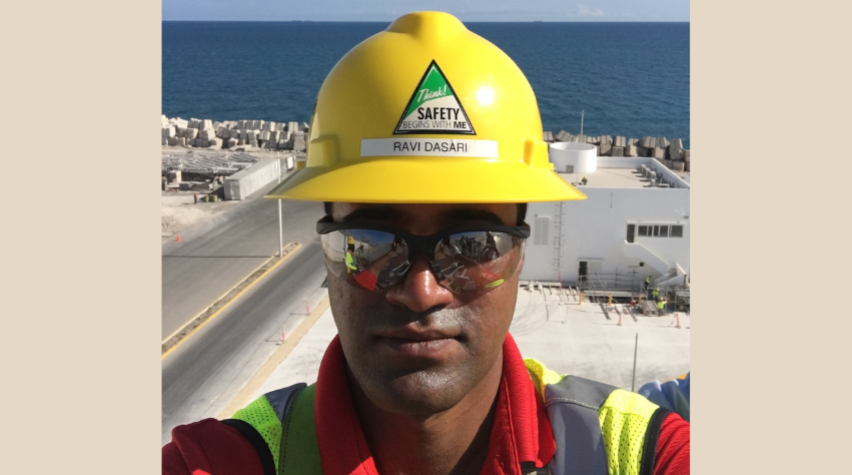
Welcome to the latest in a series of AIChE blog posts profiling process engineers, a diverse group of professionals spanning multiple industries and regions. In this series, we profile process engineers who work in a wide range of fields, including petrochemicals, pharma, bulk chemicals, food, or any process-intensive industry.
Are you a member and process engineer interested in being profiled? We’d love to hear from you via this volunteer opportunity. Please also check out our online discussion group specifically for process engineers. You can find out about these initiatives and join our efforts by visiting aiche.org/process-engineers.
This month, we introduce you to Ravi Kiran Dasari, Process Engineering Manager at Audubon Companies in South Houston, Texas. He discusses the path that led to his career in process engineering, overcoming challenges, and the importance of his work.
Tell us a bit about your work as a process engineer.
My current role as a Process Engineering Manager at Audubon Companies includes managing and directing process technology work activities to execute Audubon’s scope of work according to contract requirements. I lead teams of engineers to develop drawings and specifications for study, feasibility, front-end engineering development (FEED), and engineering, procurement, fabrication, and construction (EPFC) phase project definition and/or execution.
Additionally, I prepare design margin tables to support value improvement practice, and provide assistance and technical direction to support both Audubon and client business and project development goals. I also develop departmental support programs and procedures in addition to establishing and maintaining effective communications with engineering disciplines and project management.
Before Audubon, I was working at Kiewit, an oil and gas startup company in Houston, Texas, where I was placed in a similar capacity at a senior level.
Why did you become a process engineer?
I was born in Bhubaneswar, India, and grew up in Vizag, India, where I received my bachelor’s degree in chemical engineering. Since childhood, I was fond of chemistry and laboratory experiments. I was always curious about how gasoline for cars was generated or LPG for cooking. In undergrad, I took a course on mass transfer and the role that the separation of crude oil and its products like gasoline and diesel play in running automobiles. Since that subject has always excited me, I decided to delve into it in more detail by using software to simulate and model the distillation columns for refined products, under the guidance of my professors both at the undergrad and graduate levels. This is how I embarked on my journey toward the chemical engineering world.
I spent about 25 years of my life traveling across various parts of India until 2005. Then, I decided to come out of my comfort zone and explore opportunities around me, including pursuing and completing my master’s degree in chemical engineering from Wayne State and Lamar University in the U.S.
What are some of the biggest challenges you’ve faced in your role as a process engineer?
The biggest challenge I came across was when I was a process engineer supporting commissioning and a startup project in Mexico. I was part of the project during the late design stages and had to fix an issue involving safety valve sizing of a jet fuel coalescer done by a different entity. The wrong or original sized safety valve was delivered to the site and I escalated the issue to the higher construction management. I ensured we got the correctly sized safety valve to the site via flight through our contracts specialist. This saved time on installation/commissioning and startup of the particular unit.
Another most common challenge is dealing with a team and ensuring everyone is on the same page, understanding the scope of the work, and not deviating from it in the last phase of the project.
How is your work as a process engineer critical to your particular job assignment or industry?
As a process engineer, my work is very critical to design in the early stages of a grass-roots plant, and it’s important in evaluation studies like debottlenecking for brownfield plants. Based on these conceptual studies, the rest of the design takes shape, and its important to take all the cases into consideration.
In my case, my role is critical as I am not restricted to a particular technology. I have worked with almost all of the different technologies which makes it easier to handle any new technology per the market demand.
What do you think is most important about what you do as a process engineer?
I always try to go over lessons learned at the end of a project or proposal and ensure that those lessons are kept in account to avoid risks in the future and achieve good design ensuring a successful startup of the plant. In other words, a process engineer needs to take commissioning and startup into consideration during the engineering design phase. It’s also important to stay up to date on various industry standards and practices for good and safe design.
Connect with Ravi on AIChE Engage
Join the Community of Process Engineers
The Community of Process Engineers is brought to you by Scott & Karen Love. Their support enables the AIChE Foundation to advance process engineers at every stage of their career allowing them to Do a World of Good.
AIChE Foundation – Doing a World of Good Campaign

If you are interested in learning more about professional development, networking, and interviewing, be sure to check AIChE Career DiscoveryTM, which is part of the Institute for Learning & Innovation (ILI). See upcoming instances of the Career Discovery Workshop on AIChE Academy and read more about the process here.
Learn more about professional development


